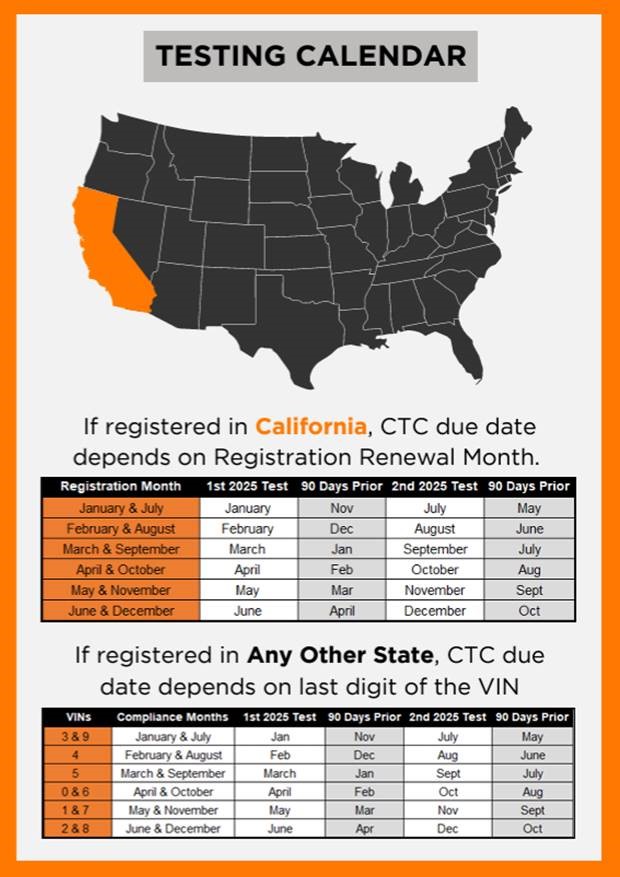CARB'S Newest Program: Clean Truck Check
Are you ready for the Clean Truck Check Program?
Clean Truck Check – Periodic Inspections
California’s new Clean Truck Check Program requires all vehicles entering California to complete a proactive, periodic inspection, per truck and provide inspection results to CARB in order to receive a Truck Certificate. Truck Certificates are required to renew DMV registration and operate in California. The Clean Truck Check program applies to all non-gasoline vehicles with gross vehicle weight of 14,001+ lbs. and above. This regulation also applies to vehicles registered out of state, but come into California. Fleets should have created their Clean Truck Check – Vehicle Inspection System (VIS) accounts and paid CARB truck fees for both 2023 & 2024. CARB CTC fees are due annually. We are now in phase two of the Clean Truck Check program where fleets must conduct periodic testing, by credentialed CARB testers. The periodic inspections are required to prove to CARB there are no active ECU or MIL issues on your vehicle. Failure to provide these inspection results will result in a CARB hold when you attempt to renew your DMV registration.
When are inspections due?
If you are registered in California, your inspection due dates are based on the truck’s registration expiration date.
If you have California exempt plates, your inspection due dates are based on the last digit of the VIN.
If your truck is registered outside of California, your inspection due dates are based on the last digit of the VIN.
Fleets are allowed to test 90 days prior to your due date. CARB are specifically looking to make sure there are no active MIL issues or emission related fault codes are present on your truck.
Testing Frequency
Clean Truck Check periodic inspections will need to be performed and submitted to CARB twice a year. In 2027, the frequency will increase to quarterly.
- In 2025, the Periodic Testing Interval is 2 times per year
- In 2026, the Periodic Testing Interval is 2 times per year
- In 2027, the Periodic Testing Interval is 4 times per year
Inspection Schedule – California Registration Renewal Date:
If your registration is good through 7/31/2024, your “due dates” are January & July. You will test by January & July of each year. You may complete your inspection 90 days before your due date. Do not inspect earlier than 90 days before your due date, as CARB will require a second test within the 90 day window in order to accept and pass your vehicle and issue a Truck certificate.
Inspection Schedule – Out of State Registered or Exempt Plates:
If your registration is good through 12/31/2099 or you are registered in another state, refer to the last digit of your VIN to determine your due date. For example, if the last digit of your VIN is a 4, then your due date is February & August each year. You may start your inspections 90 days before your due date, which means you will get started December and June of each year, to ensure you give yourself enough time to make repairs, if needed.

FleetCrew help fleets, just like yours, manage this program, from account creation, on-going updates, to monitoring inspection due dates and reaching out when due, dispatching mobile technicians to your facility to conduct the required CARB testing. FleetCrew help keep you on the road and California compliant. If you would like to outsource all or a portion of this new regulation to FleetCrew, please send us an email or give us a call. FleetCrew are trusted compliance partner for California rules and regulations, and are knowledgeable in the regulatory rules. FleetCrew have the infrastructure to support the execution in dealing with thousands of vehicles at one time. If you know of any other fleet manager busy and now faced with having to learn and comply with another California regulation, please let us know, we'd be happy to assist them.
Take the Headache out of Managing CARB Compliance by partnering with FleetCrew for all your Compliance Needs.
Schedule a ConsultationWhy FleetCrew?





Stop stressing over CARB'S complex compliance regulations

Reduce inspection costs, streamline processes and mitigate risks

Painlessly obtain Truck Certificates and renew DMV registrations

Avoid costly compliance violations & fines

